- Home
- Samuel Beckett
Dream of Fair to Middling Women Page 11
Dream of Fair to Middling Women Read online
Page 11
“A bottle” sighed the Juniperite “a bottle of the dark Export.”
“Pree-cisely” said the Mandarin “the darker draught, the dark Export, call it what you will.”
“Leave him alone” snarled the Madonna “go and drink your own dirty old beer.”
The Mandarin beamed and struck a nervous posture.
“My dear” he chuckled, out of the midst of his contortion, “that is just the very thing, you have put your finger on just the very thing, that I was proposing to do. That is” he added “unless somebody would prefer I did not.”
“But wouldn't you like to stay here” said Belacqua “just a little bit longer and have another dance with the glider and then follow us on?”
“No” wailed the Madonna. They were all against her.
“Go on Smerry” urged the Mandarin “don't be such a goat. We're only going round the corner to Meisters.”
The recordman saved what was developing into a nasty situation. Heavenly God, but he was indeed the right height, when you saw them glued together like that for the take-off. Belacqua closed his eyes.
Her face appeared over his shoulder.
“Schwein” she said.
They had a fleeting consommation on their way out. Belacqua invited Eva to have a Steinhäger.
“If you don't mind” said Eva “I think I'll have a little Goldwasser.”
“It's all the same to me” said Belacqua, with a blush, “what you have.”
The Mandarin devoured his braised celery. “This is not eating” he said “this is an aesthetic experience.”
Belacqua was very red in the face.
“It confuses the issue” he said.
“Hast Du eine Aaaaaahnung!” cried the Mandarin.
Belacqua dropped his cigarette on the table-cloth. He was getting very close to where he wanted to be. Soon he would start to talk.
“Weib” he said, and stopped unexpectedly.
The Mandarin looked up with his fork in the air.
“God bless ’em” he said piously “we can't get on without ’em.”
“Weib” said Belacqua “is a fat, flabby, pasty, kind of a word, all breasts and buttocks, bubbubbubbub, bbbacio, bbbocca, a hell of a fine word” he sneered “look at them.”
“No ideeeea” panted the Mandarin.
“And as soon” proceeded Belacqua “as you are aware of her as a Weib, you can throw your hat at it. I hate the liars” he said violently “that accept the confusion, faute de mieux, God help us, and I hate the stallions for whom there is no confusion.”
“Stallions?” echoed the Mandarin. He was shocked. “Liars? Confusion?”
“Between love and the thalamus” cried Juniperus “how can you ask what confusion?”
The Mandarin drew the heel of his hand sadly across his mouth.
“I'm only an incompetent married man” he said “with a family, but it never occurred to me that I was either a liar or a stallion.”
“Nor ever a lover.”
“In a most high and noble way of my own” said the Mandarin “not your way. Neither better nor worse. Just not your way. I know you” he said “a penny maneen of a low-down low-church Protestant high-brow, cocking up your old testament snout at what you can't have.”
“Worse!” cried Belacqua, “baser! meaner! dirtier!”
The Mandarin was delighted.
“Hating the flesh” he guffawed “by definition.”
“I hate nothing” said Belacqua. “It does not amuse me. It smells. I never suffered from pica.”
“Weibery and corruption” sneered the Mandarin “and what about our old friend the Incarnate Logos?”
“Don't sneer at me” cried Belacqua “and don't try and sidetrack me. What's the good of talking to a Jesuit!”
“You are a sentimental purist, I suppose,” said the Mandarin “and I, praise be to God and his holy name, am not.”
“Meaning” said Belacqua “that you can love a woman and use her as a private convenience.”
“If such” smiled the Mandarin “be her desire.”
“She can work both ways.”
“Since such is her desire.” He suddenly threw out his great arms and sunk his head in a crucified invocation. “Lex stallionis” he said.
“Get thee to a stud” said Belacqua.
“Your vocabulary of abuse” said the Mandarin “is arbitrary and literary and at times comes close to entertaining me. But it doesn't touch me. You cannot touch me. You simplify and dramatise the whole thing with your literary mathematics. I don't waste any words with the argument of experience, the inward decrystallisation of experience, because your type never accepts experience, nor the notion of experience. So I speak merely from a need that is as valid as yours, because it is valid. The need to live, to be authentically and seriously and totally involved in the life of my heart and…”
“Have you forgotten the English for it?” said Belacqua.
“My heart and my blood. The reality of the individual, you had the cheek to inform me once, is an incoherent reality and must be expressed incoherently. And now you demand a stable architecture of sentiment.”
The Mandarin shrugged his shoulders. There was no shrug in the world, and not many shoulders, like the Mandarin's.
“You misunderstand me” said Belacqua. “What you heard me say does not concern my contempt for your dirty erotic manoeuvres. I was speaking of something of which you have and can have no knowledge, the incoherent continuum as expressed by, say, Rimbaud and Beethoven. Their names occur to me. The terms of whose statements serve merely to delimit the reality of insane areas of silence, whose audibilities are no more than punctuation in a statement of silences. How do they get from point to point. That is what I meant by the incoherent reality and its authentic extrinsecation.”
“How” said the Mandarin patiently “do I misunderstand you?”
“There is no such thing” said Belacqua wildly “as a simultaneity of incoherence, there is no such thing as love in a thalamus. There is no word for such a thing, there is no such abominable thing. The notion of an unqualified present—the mere 1 am'—is an ideal notion. That of an incoherent present—‘I am this and that’—altogether abominable. I admit Beatrice” he said kindly “and the brothel, Beatrice after the brothel or the brothel after Beatrice, but not Beatrice in the brothel, or rather, not Beatrice and me in bed in the brothel. Do you get that” cried Belacqua “you old dirt, do you? not Beatrice and me in bed in the brothel!”
“I may be stupid” said the Mandarin “and then again I may not…”
“A thousand times better” said Belacqua “Heep than the evenhanded dirt.”
“I do loathe” said the Mandarin, with conviction, “the things you write about.”
“Like hell you do!” said Belacqua.
“And your cock-eyed continuum!” The Mandarin paused to find words for it. “What's wrong” he said suddenly “may I ask, with you and Beatrice happy in the Mystic Rose at say five o'clock and happy again in No. 69 at say one minute past.”
“No.”
“Why not?”
“Don't talk to me” implored Belacqua. He looked across at the coral face. “Forgive me” he groaned “can't you see you humiliate me? I can't tell you why not… not now. Forgive me” and he stretched out his hand.
The Mandarin beamed all over.
“My dear fellow!” he protested. “Dare I give you a little word of advice?”
“Do” said Belacqua “do.”
“Never try and be able to tell me.”
“But I don't have to” said Belacqua, taken slightly back. “Why do you say that?”
“We might have to mourn you.”
Belacqua laughed.
Then said the Jew:
“Behold how he loved her” and joined in the laughter of Belacqua.
They were still cackling heartily when the Madonna came on, with the Belshazzar, no less a person than the Belshazzar, at heel.
“Just to tell you�
�� she notified “that you are invited to Sauerwein's studio.”
“Then” said the Belshazzar “I'll drive you all up to the Height in my new car.” Everything was working out beautifully for the Belshazzar. Belacqua made a cast at a venture:
“J'ai le dégoût très sûr” he said.
“What do you say?” exploded the Smeraldina.
“Tell Mr. Sauerwein” said the Mandarin loftily “that we cannot see our way to honouring his studio, but that we are more than happy to know that he is at home.” He bestowed a leer on all whom it might concern.
“Speak for yourself” said the Smeraldina “haven't you done enough damage?”
“My beautiful new car” cooed the Belshazzar. It occurred suddenly to the Smeraldina that here at least was a man.
“Bel” called the Mandarin.
“Sir” said Belacqua.
“Another dirty lowdown German mechanic.” “Altro che” said Belacqua.
“What do you say?” fumed the Smeraldina “what does he say?”
“That is the Portuguese” said the Mandarin “for and how. Tell Mr. Sauerwein or Sauerschwein, will you my dear, from me…”
“Bel!”
“Hello” said Belacqua.
“Are you coming?”
“And the glider?” said Belacqua.
“Bel, you said you wanted to see that portrait.”
“Portrait?” said Belacqua.
“Bloody well you know the portrait” guffawed the Mandarin.
“The one he did of me in my bathing-dress.”
“His hand must have been trembling” said the Mandarin “when he was doing it.”
“Tell Mr. Sauerwein…”
The Smeraldina whistled up the Belshazzar and plunged towards the door.
“Smerry!” cried Belacqua, staggering to his feet.
“Before Mr Sauerwein was” said the Mandarin “we are.”
“What's biting her?” demanded Belacqua, despairingly.
“She'll be all right” said the Mandarin. “Why it is I don't know, she…”
So shall their voices pass away, begin and end, the syllables sound, sound and pass away, the second after the first, the third after the second, and so forth and so on in order, until the last after the rest, and silence, with a bit of luck, after the last…
“Now” said Belacqua “at last I can say what's on my mind.”
A convulsion of attention pealed down the Mandarin.
“In the old town” said Belacqua “correct me if I am wrong, a certain Fräulein Anita Furtwängler sits by her window.”
“Wisdom gleams through me” cried the Mandarin “I shudder and kindle.”
“The perfection of her limbs” pursued Belacqua “has been weighing me up to the peace of Jerusalem. I have the address of Abraham's bosom.”
“Zahlen!” cried the Mandarin. “Telephone for the Grauler!”
“The true Shekinah” said Belacqua “is Woman.”
“Nastasia Filippovna!”
“In her latter days” said Belacqua, putting by his change, “wouldn't you be inclined to say?”
“That may be” said the Mandarin “you may be right.”
Dawn. Belacqua rang at the studio of Herr Sauerwein. The blue-black seraphim in his heart, so that it bled.
“The Smeraldina?”
“Waiting for you” said Herr Sauerwein, contemptuously.
“From the rosa mundi” explained Belacqua “to the rosa munda.”
“That can be” said Herr Sauerwein.
She recommended strongly a Wirtschaft on the Height and the Grauler drove them up to it in his superb machine, up and up from the dregs of the town to the snows. There they kissed again with any God's quantity of tears. She ordered a dish of soup to comfort him, she ordered it piping hot, and a Schokolade and cookies to comfort herself. When he realised what she had done, he said:
“My wonderful one, I don't want soup, I don't like soup.”
“What then?” she said.
“Nothing” he said. “I want to look at you.” He burst into more tears. “What I want” he whinged “is to look into your eyes, your beautiful eyes, and then out of the window at the morning, and then back at you. I don't want soup, I don't want anything.”
“Just a little hot soup” she coaxed “to do you good? Nik?”
Now what he could not stand was being wheedled and made a fool of about his food. He really did abhor soup.
“I tell you” he said fretfully “I don't want the bloody stuff, I don't drink it.” Then, perceiving that the dear girl was wounded: “Darling” he said in a calmer tone “call him back, there's a good girl, and countermand it.”
She countermanded the soup. Now she was lashing into the cookies, she was bowed over her plate like a cat over milk, she was doing her best, the dear girl, not to be greedy. Every now and then she would peep up at him out of her feast of cream, just to make sure he was still there to kiss and be kissed when her hunger would be appeased by the Schokolade and cookies. She ate them genteelly with a fork, doing herself great violence in her determination not to seem greedy to him; often she paused to wipe her lips discreetly with the paper napkin, and she kept the best of each cooky for the last mouthful. She was like a cat or a bird feeding, making happy little pecks and darts and licks at the food and every now and again peeping up to see was everything in order.
When she had finished she moved over beside him and began to paw him. He did not want to be pawed, he had got all the pawing he could stand elsewhere; also he had counted on Herr Sauerwein and the Belshazzar, one or the other or both together, to assuage the Smeraldina. Was it possible they had not? Anyhow, he blocked her leads for a little while and then moved away to the window and looked out. The worst might come to the worst, but for the moment he could not bear to be pawed and slabbered on, and least of all by the reigning fetish. All he wanted was to know a few good prods of compunction and consider how best his quiet breath, or, better still, his and hers mingled, might be taken into the air.
He felt her exasperation behind him and heard her drumming on the table with her nails. She had polished off her little feast of cream and chocolate. Very well then: why wouldn't he come to her? He continued to look out of the window with his back turned to her, he ignored the drumming. He felt queasy from all the rubbing and pawing and petting and nuzzling, all the rutty gobble-gobble and manipulation. Suck is not suck that alters… All of a sudden he felt clammy, he felt a great desire to hurry out and lie down in the snow. He pressed his face against the rimy pane. That was lovely, like a glass of water to drink in prison.
In a paroxysm of pruritus she stamped, she set up a nasty caterwauling.
“Bel” she miauled “come.” She tambourined a tatoo on the table. “Muß Dich haben, muß Dich haben…” The squalling fell to a thin snuffle of libido, “… haben, ihn haben…” What she meant by that and what pleasure she hoped to get out of that cannot be made clear.
Feeling very clammy and groggy he moved his face to a fresh cold patch of the pane. The snuffling and muttering went on behind him. It was like a drip of sanies into an empty bucket. A beastly noise. In another moment he would be catting all over the floor.
Suddenly he turned round, it was not possible to endure more, and he made a definite statement:
“I feel sick, I must get out into the air.”
She was still now and hunched, her face in her lap, her hefty cambered spine presenting anything but an elegant appearance. At least she had stopped dripping.
“Go on” she said, without moving.
Oh, she need not fret, he was going. The question was, was she coming with, or was she staying there.
“No” she said.
Oh, very well, she could please herself, aufwiedersehen then in that case. You can stay there, he thought, stamping down through the snow alone, whining and dripping till the cows come home. There's as much pity, he thought, due to a woman caterwauling as to a goose going barefoot. He scooped a big pad of snow
off the bank and crushed it against his face. That did him all the good in the world. Explicit, he said aloud, and gratias tibi Christe. And so it was. For once in his life he was correct in what he said. Except of course, that certain aspects of her abode in his heart, like wind in a dyspeptic's stomach, and made themselves felt from time to time in the form of a sentimental eructation that was far from being agreeable. She continued to bother him as an infrequent jolt of sentimental heartburn, nothing to write home about. Better, he thought, the odd belch than the permanent gripe.
Thus that was that, and small credit to either of them. She knew and he knew, and God knows it was high time.
To be sure the next few days, ere he took himself off to Hamburg, were more tears and more recriminations and more tears and more huddling and cuddling and catch-as-catch-can hugger-mugger and more tears and sweats and fiascos, a most painful time. But he knew and so did she. It was all over bar the explanations and the jostling when he stepped off in the Wirtschaft on the Height that Silvester's morrow, leaving her to her own devices to begin the new year in whatever way she saw fit. She had an extensive repertory of devises and an accommodating sense of fitness. He saw the last of her through a veil of nausea, and she was metamorphosed into a hiccup.
She salted her chambering with remembrance of him.
Extraordinary how everything ends like a fairy-tale, or can be made to; even the most unsanitary episodes.
UND
The Empress Wu of China took the chair at Cabinet council wearing a false beard. The lily was nearly as fair and the rose as lovely as God Almighty the Empress Wu.
“Bloom!” she cried to the peonies “bloom, blast you!”
No. Not a stir out of them. So they were all extirpated, they were rooted up throughout her dominions, burnt and their culture prohibited.
Now, having got so far, our opinion is we might do worse than slip, in the elegant phrase, our sad spaniels and let them quest. We durst not, our taste, the literary cui bono, precludes it, make a sudden leap, princum-prancum!, from the pleasant land of Hesse, the German garden, to marshy Dublin, its paludal heavens, its big winds and rains and sorrows and puddles of sky-flowers; from the merely snout-fair Smeraldina, that petulant, exuberant, clitoridian puella, who has not the first glimmering of an idea of how to set her cold bath on fire, whom now it is high time to turn round and dislike intensely, like collops of pork gone greasy, to Alba, Alba, royal diminutive, Du, dust of a dove's heart, the eyes the eyes black till the plagal east shall resolve the long night-phrase. Can't hop about like that, really can't, must make lull somehow or other, let a little breath of the fresh into the thing somehow, little breather all round. Nik?

 More Pricks Than Kicks
More Pricks Than Kicks Happy Days
Happy Days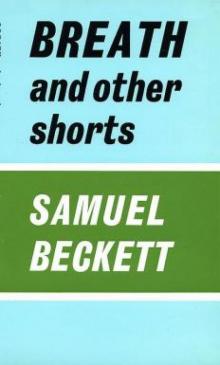 Breath, and Other Shorts
Breath, and Other Shorts Endgame & Act Without Words
Endgame & Act Without Words The Collected Shorter Plays of Samuel Beckett
The Collected Shorter Plays of Samuel Beckett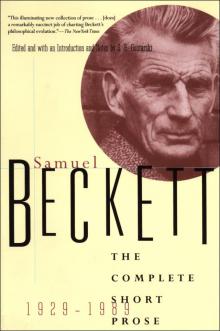 The Complete Short Prose, 1929-1989
The Complete Short Prose, 1929-1989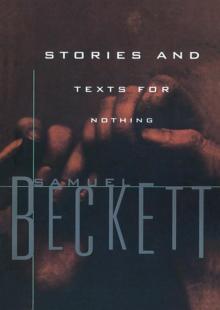 Stories and Texts for Nothing
Stories and Texts for Nothing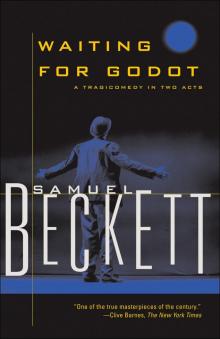 Waiting for Godot
Waiting for Godot Rockaby and Other Short Pieces
Rockaby and Other Short Pieces First Love and Other Shorts
First Love and Other Shorts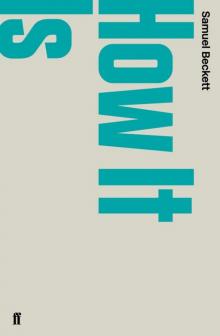 How It Is
How It Is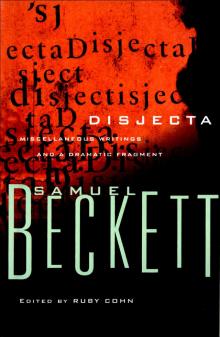 Disjecta: Miscellaneous Writings and a Dramatic Fragment
Disjecta: Miscellaneous Writings and a Dramatic Fragment Echo's Bones
Echo's Bones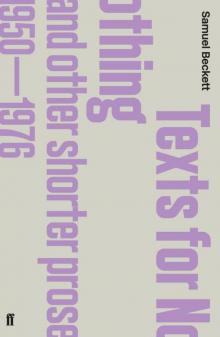 Texts for Nothing and Other Shorter Prose 1950-1976
Texts for Nothing and Other Shorter Prose 1950-1976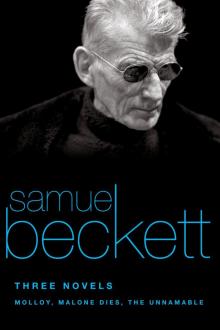 Three Novels
Three Novels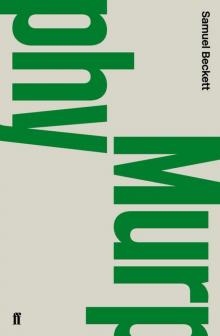 Murphy
Murphy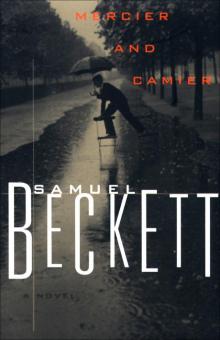 Mercier and Camier
Mercier and Camier Eleuthéria
Eleuthéria Selected Poems 1930-1988
Selected Poems 1930-1988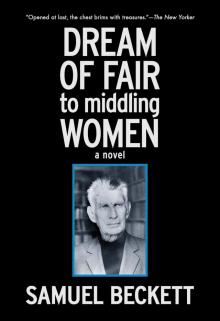 Dream of Fair to Middling Women
Dream of Fair to Middling Women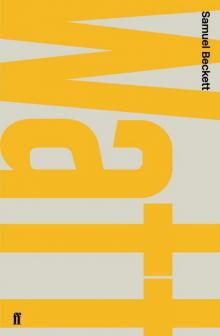 Watt
Watt Krapp's Last Tape and Other Dramatic Pieces
Krapp's Last Tape and Other Dramatic Pieces The Complete Dramatic Works of Samuel Beckett
The Complete Dramatic Works of Samuel Beckett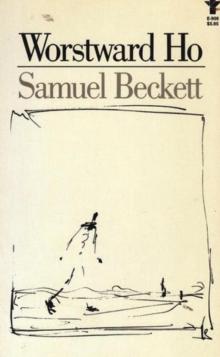 Worstward Ho
Worstward Ho Collected Poems in English and French
Collected Poems in English and French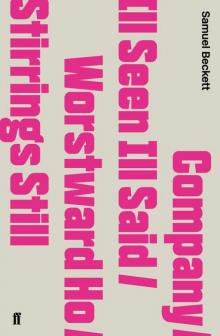 Company / Ill Seen Ill Said / Worstward Ho / Stirrings Still
Company / Ill Seen Ill Said / Worstward Ho / Stirrings Still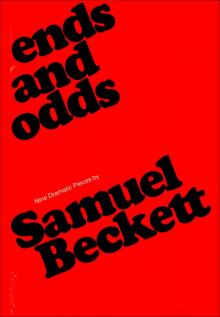 Ends and Odds
Ends and Odds Endgame Act Without Words I
Endgame Act Without Words I Rockabye and Other Short Pieces
Rockabye and Other Short Pieces The Collected Shorter Plays
The Collected Shorter Plays The Complete Dramatic Works
The Complete Dramatic Works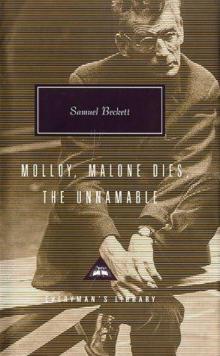 Three Novels: Malloy, Malone Dies, The Unnamable
Three Novels: Malloy, Malone Dies, The Unnamable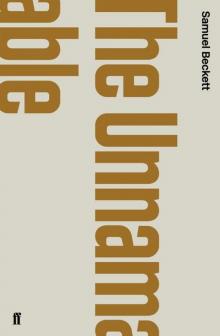 The Unnamable
The Unnamable